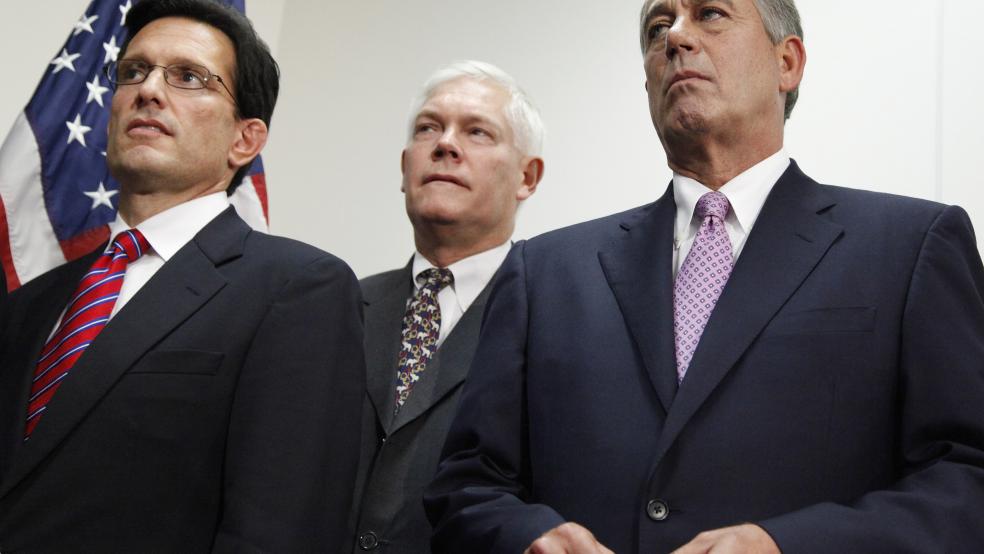Congressional Republicans likely have the upper hand the next round of budget talks, since the GOP has demonstrated a willingness to accept the sequestration spending cuts that Democrats hope to unwind.
After having been singed by the 16-day government shutdown and the potential default, Republican lawmakers and their staff are finding that being less aggressive should be to their advantage. Unlike the events leading up to the partial closure, they see less of a need to insist on defunding Obamacare as a precondition for a budget agreement, even if the problematic rollout of the health insurance program has confirmed their objections to it.
RELATED: 3 BUDGET GAMES AT THE $3.6 TRILLION TABLE
This is because most Republicans are comfortable with the current budgetary status quo, even if it’s far from their ideal. The automatic sequestration cuts agreed to in 2011 locked in deficit savings, while the fiscal cliff deal at the start of this year locks in tax rates, so it takes a legislative change to increase revenues.
COUNTING ON THE STATUS QUO
“We have the law on our side,” explained Don Stewart, a spokesman for Senate Minority Leader Mitch McConnell (R-KY). “In order for them to bust the budget caps they would need 60 votes [in the Senate] and then the House. So if we do nothing at all, spending reductions stay in place, tax relief stays in place.”
As part of the deal to raise the $16.7 trillion debt ceiling through Feb. 7 and fund government operations until Jan. 15, a conference committee of 29 lawmakers from both parties and chambers are supposed to negotiate a deal.
As leaders of the reconciliation process, Senate Budget Committee Chairwoman Patty Murray (D-WA) and her House counterpart Rep. Paul Ryan (R-WI) vowed last week to seek “common ground.”
Yet House Republicans and Senate Democrats are miles apart on an agreement.
The Senate is pressing to replace the sequester with a package of alternative spending cuts, tax loophole closings to raise almost $1 trillion in new revenue over 10 years, and some reforms of Medicare and other entitlement programs.
The House insists on spending $91 billion less in domestic spending in the coming year than the Senate favors, unalterably opposes raising revenues and still wants to talk about delaying or modifying Obamacare.
RELATED: BUDGET BRAWL COULD SIDESWIPE FED PLANS TO TAPER
Ryan, one of the power players involved in the talks, has emphasized that there are options to reduce the deficit by reforming entitlements, rather than continuing the sequester.
These options come from the budget plan submitted by President Obama that contains $371 billion in Medicare savings, in large part by reducing payments to prescription drug companies.
Ryan is optimistic, but downplayed the odds of a massive overhaul occurring.
A BARGAIN, BUT NOT SO GRAND
"If we focused on doing some big grand bargain, like those prior efforts ... then I don't think we'll be successful because we'll focus on our differences,” Ryan told Reuters last week. “Each party will demand that the other compromises a core principle and then we'll get nothing done."
The Wisconsin congressman, last year’s Republican vice presidential nominee, added that the sequester is preferential to no deficit reduction at all.
"It's not our preferred route to reducing deficit and spending, but it works," he said. "If we can't replace these spending cuts with smarter spending cuts, then we'll take what we have."
Still, no negotiating strategy is full proof.
Democrats agree that the Republicans could stalemate the talks again if they choose – simply by sitting on their hands. However, they are counting on the restlessness of House GOP appropriators who have found it nearly impossible to muster a majority of their party around spending bills for transportation, defense and other priorities at the meager levels dictated by the caps and sequester.
“They certainly could do that,” said a Senate Democratic aide last week with regard to the Republican threat to block any changes to the sequester and caps. “But despite some of the recent rhetoric from people like McConnell, they don’t really like sequestration. They spent nearly a year saying sequestration . . . would hollow out our military and hurt our national security.
RELATED: FOUR LESSONS FROM THE GOP SHUTDOWN WARS
Members across the country have constituents who are impacted by this, whether civilian defense workers who are furloughed or there are folks who were impacted by cuts in nondefense programs, transportation investments or Head Start programs.”
House Appropriations Committee Chairman Hal Rogers (R-KY) had trouble passing spending bills on the House, including one that would have funded transportation and housing programs for the coming year. The aide said that the bill “imploded not because it was spending too much but because it spent too little.”
Without a compromise, the aide said, “We’re going to lurch from short term CR to short term CR. Nobody’s problems will be solved. And we’re not going to be able to make progress on issues that many members care about from defense to transportation spending to research to general infrastructure.”
But one critical thing has changed.
Unlike a month ago when the shutdown still loomed, congressional Republicans know better than to gamble with the economy in hopes of gaining an edge in negotiations. Instead, the GOP is comfortable playing the cards it was dealt.
Greg Valliere, chief political strategist for the Potomac Research Group, met with top congressional officials last week and concluded, “GOP leaders will not allow another shutdown or debt ceiling crisis, we were told in no uncertain terms by one of the highest-ranking Republicans in the House.”





